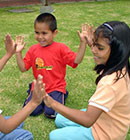Joyful Effort…
We all are desirous of the rewards of a spiritual life – a deep sense of  well-being and contentment; pleasant and meaningful interactions with others; the end of alienation and aloneness, replaced by the feeling of interconnectedness and “at oneness” with the things and beings around us; and the full realization of our true purpose and calling.
But these important life goals won’t be reached just by wishing for them.  We need to mobilize ourselves into action. We have to try, and it’s the “oomph” that accompanies the “try” that brings the “triumph.”
It can be argued that in the scheme of the Six Perfections – the virtues that guide the conduct of someone trying to live a saintly life – it is the fourth one, virya or “joyful effort,” which is the most important. Why would this be? Why would virya be more important than generosity, ethical living, patience, meditative concentration, or wisdom?  Because it is the motivating force behind the other five:
Once you have practiced patience, begin
(Guide to the Bodhisattva’s Way of Life 7.1)
Your practice of effort, for enlightenment lies
In making these kinds of effort.
Without a breeze they never flicker,
And just so in the absence of effort
Merit can never occur.
No effort, no gain – just like in any other endeavor. It takes hard work to achieve anything worthwhile, let alone the highest goals of one’s life.
Having understood the importance and purpose of virya, we next need to know what it is. Our text goes on to provide a definition: “What is effort? It is joy in doing good.” (Guide 7.2a)
This is crucial. The effort we are talking about here isn’t the “grit your teeth” variety we often employ in order to muscle through difficult tasks. It must be joyful, not done dourly or out of some puritanical sense of obligation. We should be happily engaged those activities and practices that are designed to bring us what we really want out of life. If it’s not done cheerfully, it ain’t virya.
And the Guide also notes that virya is specifically effort applied to “doing good.” While most of us are already familiar with hard work – we labor mightily for our degrees and certificates, our jobs and families, even for our hobbies and pastimes – virya is bringing that same energy to our spiritual life: to our meditation and yoga, to getting through our ACI courses and other studies, to monitoring our morality, and to the hard work of cultivating patience, forgiveness, generosity, and other virtues.
So why aren’t we bringing the full version of this powerful and joyful energy to our spiritual lives? What’s holding us back from really going for it, from the bringing the “oomph” that will make our “try” into “triumph?” Again, from Master Shantideva:
Here I will explain the things
(Guide 7.2b)
That work against it: these are
Laziness, an attraction to what is bad,
And the feeling of being discouraged – belittling yourself.
Laziness comes in two forms: just not feeling like it (that inertia that blocks us from getting off our behinds and doing what we know we should) and staying so busy with other things (our jobs, relationships, or recreation) that we just don’t get around to it. Getting one’s priorities in order and recognizing that life is short and time is running out will help overcome this first obstacle.
The second block to virya is attraction to what is bad – to habitual patterns of behavior that not only dissipate our energy but redirect it into activities that will not bring us true happiness. This includes excessive partying, endlessly texting or phoning our friends, mindlessly blogging, surfing the internet, watching TV, playing computer games, and other typical diversions of our age.
Finally, we can be hindered in putting our full (and joyful) effort into our spiritual lives by low self-esteem. Depression is at epidemic levels in our society and many of us are susceptible to this debilitating obstacle. If your practice is being held back by this particular fetter, try generating some strong bodhicitta, which means (a) remembering the whole purpose of your life is to reach the “Awakening” and true happiness we are capable of, so (b) you can help others do the same.
The best way to motivate yourself to do what you know you should is to think about others and their suffering. If we can engender a strong feeling of empathy and compassion – as well as the sense of responsibility to do something about it – it will help us get up off our derrieres and do what we need to do.
Do it for others. Joyfully. And then you’ll be doing the best thing you can do for yourself.
– Lama Marut


